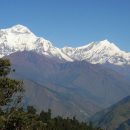Todos Santos, Guatemala
Todos Santos, Guatemala
Todos Santos is a small village hidden high in the Sierra de los Cuchumatanes. Guatemala is a mountainous country with no shortage of dramatic mountain ranges. The Cuchumatanes, however, are in a league of their own; stretching up to 12,500 feet, they are the highest non-volcanic mountain range in Central America and a sight to behold. The Cuchumatanes rise from skirts of humid jungle that gives way to pine forest as they climb upward; near the top, the trees thin into sweeping grasslands, shrouded in cloud as often as not.
There, in a steep valley parceled into fields for subsistence farming, is the Mam community of Todos Santos. The men wear traditional traje, or Mayan costume; the most striking feature is their red and white striped trousers. If a man is married, he wears a pair of shorts over his trousers. Married and unmarried men alike also sport hats, traditional shirts, and colorfully embroidered jackets.
Todos Santos is quiet for most of the year it is as quaint as it is isolated, a Mayan community that forges on without the money and attention that come from being a tourist attraction. At least once a year, however, Todos Santos plays host to a do-not-miss event. Its the villages feria, or annual festival, which takes the form of a drunken horse race on the day of the dead.
The story goes like this: when Guatemala was conquered by the Spanish, the Mam villagers of Todos Santos were introduced to horses. They quickly became adept at riding, and were revered for their skills across New Spain. The Spanish disapproved, however, and forbid the men of Todos Santos to ride. So, in protest, the villagers of Todos Santos established a horse race during their feria that is still happening some centuries later.
Although the Mam population of Todos Santos is nominally Catholic, the version of Catholicism that they practice is a syncretic one with considerable holdovers and infusions from traditional Mayan religious systems. Some still believe that the fruits of their labor or, more accurately, the corns and vegetables of their labor are at the mercy of not just the weather but the Mayan deities and Catholic saints who might intercede on their behalf.
In keeping with that belief, the feria, which falls near the end of Guatemalas wet season, is meant to please those spirits above. A couple days of hard drinking precede it; by the time the sun has risen on November 1st, many of the men are very drunk, stumbling through the dusty streets of the town. Tourists and foreigners pour in to watch them festoon themselves in colored ribbons, climb atop their horses, and ride as fast as they can back and forth down a short track of lose dirt.
It isnt a race, per say; sometimes a pack of horses will take off, and sometimes only one, and sometimes a horse without a rider. There are no officials with pop-guns or timed starts, and theres not much concern for who finishes first or last. The main business is to showcase the men, stone drunk, riding and whooping without their hands on the reins. Falls are common and ugly sometimes, injuries are serious. Deaths are not unheard of theyre believed to bring rain in the rainy season to come.
The mayor of Todos Santos banned the sale of alcohol in 2008 to try and curb the festivities. So far, no dice. In 2016, the festival was in full form, with many tiendas openly selling cervezas to the throngs who had come out to see the race. If youre in Guatemala on All Saints Day in the future. you owe it to yourself to come out and see the madness yourself.











